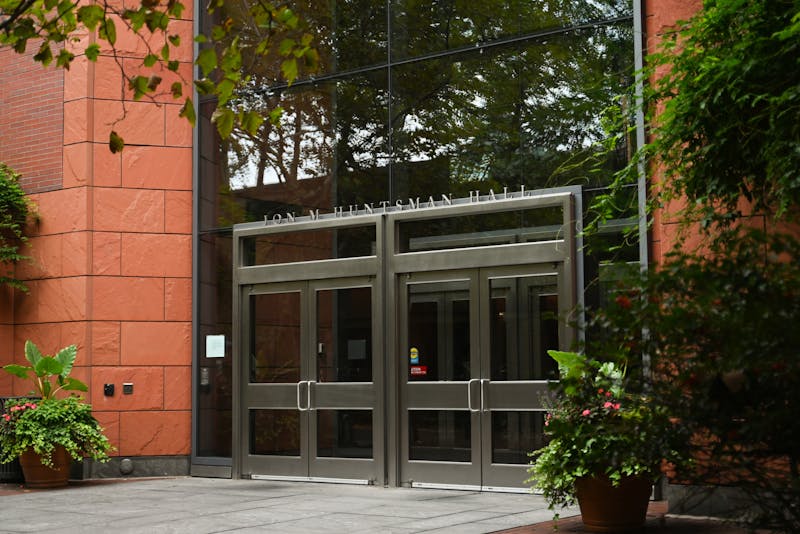I wiped my savings account this summer and, in the last weeks, I lost six toes to hunger. I hope you fared better. Perhaps you worked as an intern, earned a tidy sum and wound up indentured to some soul-sucking firm.
I heard that graduates on the International Teaching Assistants Program (ITAP) did very nicely. Each earned $4,000 to attend ITAP, an intensive English-language course that last seven weeks and is run by English Language Programs (ELP) each summer.
Blind rage, spiked with huger, possessed me. I wanted to spit out my toes and rail against SAS over bad incentives, high costs and the ineffectiveness of ITAP.
At first, I took the big money to be evidence that no stringent or credible sanctions exist to enforce proficiency in English. If you don't own a stick, you've got to dangle a really big carrot. Graduates will take the bait because most graduates are hungry - and like carrots - but big carrots cost lots of money.
My point about incentives would bite harder if completing ITAP were not compulsory. If completing ITAP were optional and the program didn't offer a stipend, I imagine that most international teaching assistants (ITAs) would risk taking either the SPEAK Test or Interactive Performance Test (IPT), fail both, and then what?
Providing a stipend would alleviate this problem, albeit at a cost.
Our world isn't like this though. Penn's Certification of English Fluency form reads, "For all graduate assistants [engaged in teaching undergraduates] whose first language is [one] other than English . departments must refer individuals to ELP for evaluation."
The chairmen of graduate groups don't need extra incentives to send ITAs away to improve their English. Graduates with broken English don't make good job-market candidates. The few graduates that ELP fails and prohibits to teach can be research assistants (RAs) instead of TAs.
So credible sanctions exist - SAS and ELP jointly own a stick.
Why then, does SAS dangle a carrot at all, let alone one of gargantuan size?
My growing rage about carrots took a knock on talking to Christos Theodoropulos, coordinator of ITA Teaching and Training at ELP, who estimates that participants in ITAP study for roughly 30 hours a week. TAs in SAS get $18,300 over nine months for 16-20 hours of work per week. SAS therefore offers a comparable stipend for taking ITAP, in expectation of a little more work each week. Tracey Turner, assistant director of financial management at SAS, tells me that that's how she sets it.
As jealous as I was, it seemed outrageously fair.
Then, Theodoropulos made an analogy to firms that pay employees over training periods, and finally I smelled an injustice. I knew little math when I applied to graduate school - SAS didn't pay me to attend a remedial summer course. Actually, I had to pay to attend Econ 897, aka Math Camp. I'm a glutton for punishment.
But there's a difference, I realized. Improving my math only helped me. English fluency for TAs gets special treatment to help you. No, not you, you smug ITA - you, the undergraduate. Penn deeply loves you and spends money on everyone but me to ensure you'll be well taught.
Still, you might ask, if everything is so great, why does my TA this semester suck? Language skills are fragile and fade quickly without constant use, like your ability to integrate complicated functions, perhaps. TA evaluation forms keep track of skill atrophy but Penn can't control patterns of socialization among graduates: Graduates like to hang out with people who speak the same language. Many ITAs just get rusty.
So what's the solution? Well, let's consider some options: only admit English-speaking grads, require repeated annual testing for fluency or make ITAP more demanding. Sound good? Maybe.
But implement any of these measures and costs either skyrocket or funds get diverted from something else you're going to complain about. It's like asking the government for better health care and lower taxes. Graduate departments lose quality students, Penn loses its reputation, and your Ivy League degree loses its value.
I'm not calling Penn out. Given the constraints, Penn is doing the best they can in a difficult situation. Not even the biggest carrots and biggest sticks in the world can help.
Harry Lee is a second year economics Ph.D. candidate from Portsmouth, England. His e-mail address is lee@dailypennsylvanian.com. The Pondskater appears on alternating Wednesdays.
The Daily Pennsylvanian is an independent, student-run newspaper. Please consider making a donation to support the coverage that shapes the University. Your generosity ensures a future of strong journalism at Penn.
DonatePlease note All comments are eligible for publication in The Daily Pennsylvanian.







